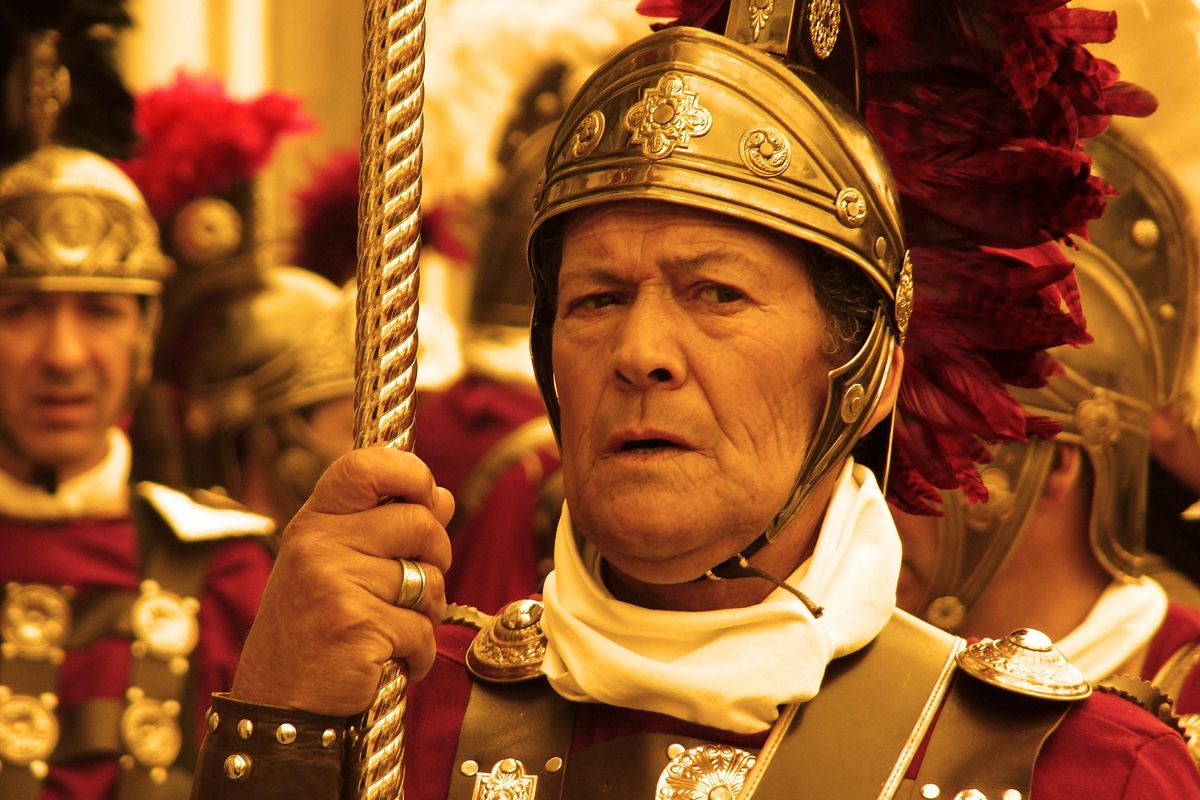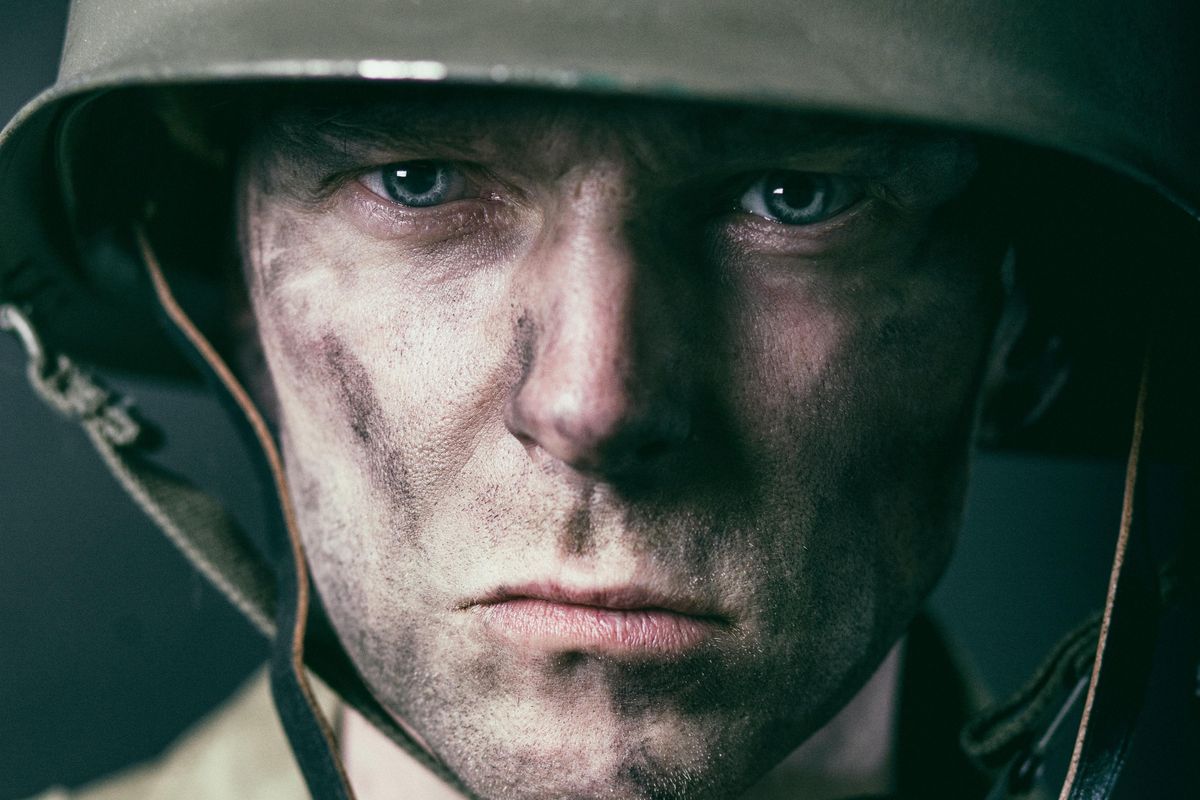Historians take to Reddit to gloriously dispel the 'boys don't cry myth'
"Masculinity and tears have not always been at odds."

Time to stop believing this myth once and for all
Who decided "big boys don't cry"?
It's not rare to see powerful and high profile men overcome with emotion at times, but when they do, it's usually met with some form of criticism or seen as a display of weakness. Simply put, in today's world boys and men are simply not expected to display vulnerable emotions like sadness and grief. (But anger is usually A-OK!)
When we think of the founding pillars of "manliness," we think of strength, bravery, and stoicism, and we often assume that it's just always been that way. After all, ancient Greek warriors didn't cry! Medieval knights didn't cry! Men just don't cry! It's, like, biology or something! Right? Right?
Well, actually...
A couple of historians recently took to Reddit to debunk this myth once and for all.
A user named Sassenacho prompted the thread on the r/AskHistorians subreddit with a simple question: "Today, there are voices that call for (much needed) acceptance of men's emotionality, but it is still kind of taboo. I was wondering when and why this changed in western society."
 Photo by Luca DG Photography on Unsplash
Photo by Luca DG Photography on UnsplashThe explanations that ensued were fascinating.
Cassidy Percoco, a curator and historian at the St. Lawrence County Historical Association and author of "Regency Women's Dress" kicked things off, explaining that "masculinity and tears have not always been at odds."
Those rough and tumble medieval knights with their shiny armor and big swords? Percoco says they were actually expected to weep on occasion.
"In the Middle Ages there was a trope of masculine weeping being a mark of religious devotion and knightly chivalry; by the sixteenth century it was well-established that a masculine man was supposed to have deep emotions and to show them — in some cases, through tears."
It was a part of the whole chivalry thing and a sign of religious devotion.

As far back as Biblical times and in the age of Greek and Roman heroes, crying out of grief or sadness was just something men were expected to do.
From there, Percoco jumped forward to 17th and 18th century England. Hundreds and hundreds of years later, men crying and sharing their feelings — a gentlemanly trait known as "sensibility" — still hadn't gone out of style.
"A gentleman was to be courteous to women and other men, to talk problems out, to keep from bursting into loud displays of anger or drunkenness. You might think that that would also put the kibosh on weeping — giving way to feelings of all sorts — but this was not the case. Another gentlemanly trait of the eighteenth century was sensibility, which today sounds like it ought to mean "rationality" but is actually being aware of and susceptible to one's finer emotions."
Alex Wetmore, assistant professor in the English department at University of the Fraser Valley, chimed in as well to explain that in the mid-to-late 1700s, popular fiction often celebrated male leads who cried "a lot"!
"People are often interested to hear that there was a period of time of a few decades (1740s to 1770s) where fiction devoted to men who cry (a lot!) was not only acceptable, but, in fact, tremendously popular and widely celebrated."
Wetmore identified an archetype, which he calls "The Man of Feeling," who appears in a ton of novels from that era. (Wetmore even wrote a bookon the subject.)
"When I try to explain this recurring character type to students, I usually describe him as like a comic book superhero ... BUT with the notable exception that the 'superpower' of men of feeling is an ability to spontaneously shed copious amounts of tears."
It's quite the contrast to the unflinching action heroes we see today.
 Photo by Sander Sammy on Unsplash
Photo by Sander Sammy on UnsplashIt wasn't until the early 1800s that things began to change, and men started feeling the pressure to hold those tears in.
Percoco and Wetmore were both hesitant to prescribe a definite cause and effect relationship, but they do suspect the Industrial Revolution played a big part in turning the tide. (Reportedly, some factory managers actually trained workers, usually men, to suppress their emotions in order to keep productivity high.)
The age of the stoic and emotionless cowboy (a la John Wayne, who most people agree never cried in a movie) wasn't far behind, followed by the gun-wielding "Die Hard"-ian action heroes of modern cinema.
But ... while fictional macho men may have been suppressing their tears, the real men of the real world were doing the same thing they'd always done: wearing their hearts on their sleeves.
For instance: General Ulysses S. Grant cried when the Civil War finally ended. President Eisenhower cried on the eve of D-Day. And baseball legend Lou Gehrig cried when the Yankees retired his number.
And, yet, since it took hold about 200 years ago, the expectation that "boys don't cry" persists.
Today's world is certainly not one that celebrates open displays of emotion from men, often to their detriment.
Research shows that these repressed feelings can often come out in unhealthy and harmful ways, and it's all so we can meet a standard of masculinity that, likely, never truly existed.
Next time you catch someone bemoaning the "wussification of American boys" and yearning for a time "when men were men," it might be worth asking them when, exactly, they think that was.
This article originally appeared on 11.20.17
- Meryl Streep slams the term 'toxic masculinity.' Does she have a ... ›
- Terry Crews has a simple way of describing toxic masculinity to men ... ›
- Pixar's short film makes a bold statement about toxic masculinity in ... ›
- A renowned psychiatrist was asked to name the biggest myth about suicide. His response is a must-read. - Upworthy ›
- Men open up about the hardest parts of being a man - Upworthy ›
- A woman's $34 Goodwill bargain buy ends up being a priceless ancient Roman artifact - Upworthy ›
- Young man becomes instant role model for giving a drunk girl a ride home with flawless chivalry - Upworthy ›






 A woman is getting angry at her coworker.via
A woman is getting angry at her coworker.via  A man with tape over his mouth.via
A man with tape over his mouth.via  A husband is angry with his wife. via
A husband is angry with his wife. via 
 Three women sit on a blanket in the park.
Three women sit on a blanket in the park. 
 a man sitting at a desk with his head on his arms Photo by
a man sitting at a desk with his head on his arms Photo by  Can a warm cup of tea help you sleep better? If you believe it, then yes. Photo by
Can a warm cup of tea help you sleep better? If you believe it, then yes. Photo by 
 Two women engaging in a pleasant conversation inside a coffee shop
Two women engaging in a pleasant conversation inside a coffee shop Two men engaging in a peaceful disagreement.
Two men engaging in a peaceful disagreement.
 A man saying "be quiet."via
A man saying "be quiet."via  A woman zipping up her mouth.via
A woman zipping up her mouth.via